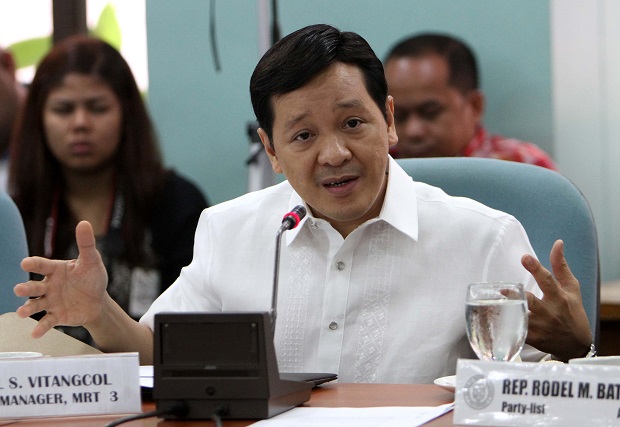Transport Secretary Joseph Emilio “Jun” Abaya won’t be dragged by the alleged shenanigans of former Metro Rail Transit (MRT) general manager Al Vitangcol.
This after the Office of Ombudsman dismissed the graft complaint against Abaya over an $11.5 million anomalous maintenance contract for the MRT.
Meanwhile, Vitangcol and his purported envoy in an alleged bribe try were indicted for graft over the contract awarded to the company of his uncle-in-law.
Abaya and other transport Cabinet officials were charged by the Ombudsman’s Fact Investigating Office. But the Ombudsman in its preliminary investigation failed to find probable cause against Abaya, an ally of President Benigno Aquino III and acting President of the Liberal Party.
On Monday, Ombudsman Conchita Carpio Morales in a press conference said she will not be cowed by the President to spare allies, citing the sacking of Aquino’s friend resigned police chief Alan Purisima over an anomalous courier service contract.
READ: ‘Nabubuwisit na ako!’ — Ombudsman Morales to critics
In its indictment, the antigraft body found probable cause to charge Vitangcol and businessman Wilson De Vera for graft for awarding without public bidding the maintenance contract for MRT 3 to Philippine Trans Rail Management and Services Corp. (PH Trams).
De Vera and Arturo Soriano, an uncle of Vitangcol’s wife, are among the incorporators of PH Trams.
READ: Vitangcol uncle says he quit firm before it bagged MRT deal
In a 39-page Resolution, Ombudsman Morales found probable cause to charge Vitangcol and PH Trams incorporators De Vera, Soriano (Vitangcol’s uncle-in-law, and now the Provincial Accountant of Pangasinan) and Marlo Dela Cruz, Manolo Maralit, and Federico Remo.
They are accused of violating Sections 3(e) and 3(h) of the Anti-Graft and Corrupt Practices Act and Section 65(c)(1) of the Government Procurement Reform Act, arising from the MRT3 interim maintenance contract.
They allegedly conspired to irregularly award the MRT3 contract to the PH Trams-CB&T joint venture.
According to the Ombudsman, Vitangcol used his powers and authority as general manager, chief end-user, head of the negotiating team, and member of the Bids and Awards Committee (BAC), all at the same time, “to dictate the proponents invited for the preliminary negotiations” of the maintenance services.
Vitangcol also “intentionally hid his [affinitive] relationship with Soriano, which would have automatically disqualified PH Trams.”
The Ombudsman also said the PH Trams incorporators were liable for executing a false Affidavit of Disclosure dated Aug. 12, 2012 which stated that none of the incorporators are related by affinity with any member of the procurement teams.
The Ombudsman found no merit in Soriano’s claim that he divested his interests in PH Trams on Sept. 10, 2012 because no waiver was recorded in the Securities and Exchange Commission (SEC).
Soriano’s claim also ran counter to his Statement of Assets and Liabilities Net Worth where he declared that he obtained an interest as PH Trams stockholder in Nov. 2012.
Vitangcol and De Vera were accused of extorting $30 million from Inekon Group CEO and chair Josef Husek at the residence of then Czech Ambassador to the Philippines Josef Rychtar in exchange for granting Inekon the P3.7-billion contract to supply 48 coaches for the MRT 3 expansion. The money was later reduced to $2.5 million.
READ: Czech Ambassador Rychtar: I’m not afraid of Vitangcol
The Ombudsman is still investigating the alleged bribery.
According to the complaint that the Ombudsman investigated, the contract was awarded to PH Trams in a negotiated procurement on Oct. 2012 even though there was no emergency situation to justify it.
The SEC records also show that PH Trams was two months old when the project was awarded, having been incorporated only on Aug. 2012 with a paid-up capital of only P625,000.00.
Section 3(e) of R.A. No. 3019 prohibits public officials from causing any undue injury to any party, including the Government, or giving any private party any unwarranted benefits, advantage or preference in the discharge of his official administrative or judicial functions through manifest partiality, evident bad faith or gross inexcusable negligence.
Meanwhile, Section 3(h) of the antigraft law prohibits public officials from directly or indirectly having financial or pecuniary interest in any business, contract or transaction in connection with which he intervenes or takes part in his official capacity, or in which he is prohibited by the Constitution or by any law from having any interest.
Section 65(c)(1) of R.A. 9184 punishes the act of “submit[ting] eligibility requirements of whatever kind and nature that contain false information or falsified documents calculated to influence the outcome of the eligibility screening process or conceal such information in the eligibility requirements when the information will lead to a declaration of ineligibility from participating in public bidding.” IDL
RELATED VIDEO
